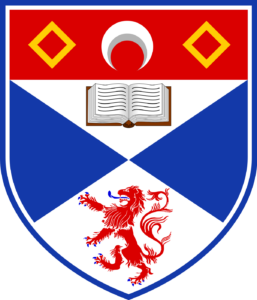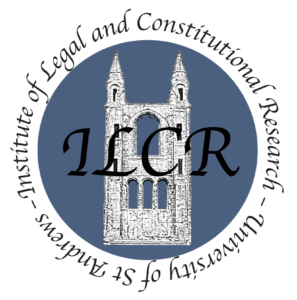Steering Committee
Dr Dan Armstrong, School of History
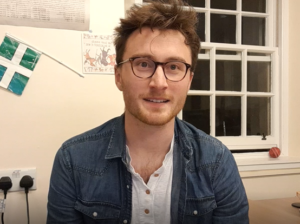
Dan is a postdoctoral researcher in the School of History. He did an undergraduate degree in History at Downing College, Cambridge where he graduated in 2017 with a First. Dan then did an MA in Medieval History at the University of East Anglia, where he was funded by the AHRC and graduated with a distinction. Previously at St Andrews he was a PhD student on the European Research Council Project Civil Law, Common Law, Customary Law and was also a Royal Historical Society Centenary Fellow at the Institute of Historical Research in London. Dan’s research primarily focuses on the relationship between the English kingdom and the papacy during the reigns of William I, William II, and Henry I. His work seeks to challenge the idea that the English kings set-up a barrier to prevent papal influence within the kingdom, in attempt to dismantle the anachronistic scaffolding of conflict between Church and State that still provides the main interpretative framework for Anglo-Papal Relations. He is interested in both the circulation and use of Canon Law within Anglo-Norman England as well as the Norman Conquest of England.
Dr Elizabeth Ashford, School of Philosophical, Anthropological and Film Studies
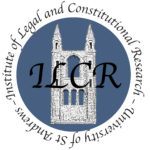
Elizabeth Ashford joined the Department of Moral Philosophy in 2001. She did her MA at UNC Chapel Hill and her BA and DPhil at Oxford University, and was awarded her DPhil in 2002. Her main research interests are in moral and political philosophy. She has recently finished a contribution to UNESCO Volume I, Freedom from Poverty as a Human Right (OUP forthcoming), and her current research project is to develop a book on utilitarian and Kantian conceptions of impartiality and of rights. During the academic year 2005-6 she was a Visiting Faculty Fellow in Ethics at the Harvard University Edmond J. Safra Center for Ethics, and the following summer she was an H.L.A. Hart Visiting Fellow at the Oxford University Centre for Ethics and the Philosophy of Law.
Dr Adam Bower, School of International Relations

Adam Bower is lecturer in the School of International Relations at the University of St Andrews. He was previously a SSHRC Canada Postdoctoral Fellow in the Department of Politics and International Relations, University of Oxford and a Non-Stipendiary Research Fellow at Nuffield College (2013-2015). From 2012-2013 he was a Max Weber Postdoctoral Fellow at the European University Institute in Florence, Italy. Adam’s research is concerned with understanding how international law transforms global politics, and how political forces shape the development and efficacy of the law. More specifically, he examines how legal institutions – especially multilateral treaties – shape the conduct of actors by instantiating new social expectations about appropriate behaviour (norms) in the international system. Empirically, he explores this theme principally in the fields of disarmament and international humanitarian and criminal law. His teaching interests are informed by this broad research agenda, and span IR theory, international law, and international organizations and governance.
João Rafael Cunha, School of Economics and Finance
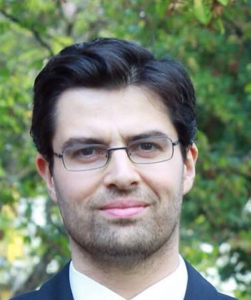
João Rafael Cunha is a Lecturer in the School of Economics and Finance at the University of St Andrews. He is also a member of the Institute of Legal and Constitutional Research and Centre for Global Law and Governance. Previously, he was a Research Fellow in the Faculty of Economics at the University of Cambridge, a Max Weber Fellow in the Robert Schuman Centre and the Department of Economics at the European University Institute and a Marie Curie Research Fellow at the London School of Economics. His research interests include Financial Regulation, Banking, Political Economy, Law and Economics, Economic History, Macro-Finance, International Macroeconomics and Finance.
Dr Alex Davis, School of English

Alex Davis received his BA from the University of Oxford, and an MA and PhD from the University of London. His doctoral research dealt with representations of chivalry in sixteenth- and seventeenth-century culture and how these have subsequently figured in attempts to present the ‘early modern’ period as a break with the medieval past. Alex works on the literature and culture of the English Renaissance. His research has focused on romance, popular culture, and on the prose fiction of the period. He has a particular interest in the Renaissance sense of the past and the question of the period’s relationship with both classical antiquity and the Middle Ages. He is the author of two books: Chivalry and Romance in the English Renaissance (2003) and Renaissance Historical Fiction (2011). Alex is a participant in the British Academy funded research network on ‘Seventeenth Century Fiction: Text and Transmission’.
Dr Melissa Demian, School of Philosophical, Anthropological and Film Studies

Melissa Demian is Senior Lecturer in the Department of Social Anthropology at the University of St Andrews. She holds a BA from Bryn Mawr College, and an MPhil and PhD from the University of Cambridge. Previously she was a Lecturer at the University of Kent and a Fellow at the Australian National University. Dr Demian is primarily a legal anthropologist, having spent most of her career researching different aspects of Papua New Guinea’s legal system, from the country’s village courts to its Constitution. In addition to her work on various aspects of law in the Pacific postcolony, she has researched and published on matriliny, child adoption, land disputes, domestic violence, local histories and temporalities in the service of ethnic identity formation, and the ‘cultural defense’ in criminal law. She pursues both research and teaching on the appropriation of classic anthropological concepts to fit emergent legal dilemmas.
Lady Drummond, Senator of the College of Justice in Scotland
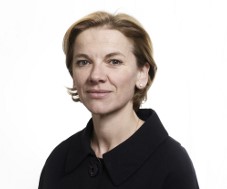
Lady Drummond was admitted as a solicitor in 1993 and employed as Assistant Scottish Parliamentary Counsel and Assistant Legal Secretary to the Scottish Law Officers before being called to the Bar in 1998. She developed a wide practice in administrative and constitutional law, immigration, extradition, mental health, planning and commercial law. From 2002 to 2007 she was appointed Standing Junior to the Home Department and instructed in immigration and human rights cases. In 2007 she was appointed by the Foreign Office as Crown Counsel for a British Overseas Territory dealing with criminal, employment and administrative law. She returned to practice at the Scottish Bar in January 2009 and took up appointments as Standing Junior Counsel to the Scottish Government and Part Time Sheriff. She was appointed ad hoc Advocate Depute in 2010 and to the Equality and Human Rights Commission Preferred Panel of Counsel in 2011. In 2015 she became a full time resident sheriff and was appointed Justice of Appeal in the Court of Appeal in the Territories of St Helena, Ascension and Tristan da Cunha. In 2020 she was appointed Sheriff of the Sheriff Appeal Court and in May 2022 she was appointed Senator of the College of Justice in Scotland (judge of the Supreme Courts of Scotland). She is co-author of a book on judicial review, A Practical Guide to Public Law Litigation in Scotland (2019).
Dr Will Eves, University of Nottingham School of Law

Will Eves is an Assistant Professor in Law at the University of Nottingham. Prior to this, he was a Research Fellow in the University of St Andrews’ Institute of Legal and Constitutional Research (2017-2021) and a Scouloudi Junior Research Fellow at the Institute of Historical Research, University of London (2015-2016). His research focusses on the procedural and doctrinal development of the early English common law, particularly in the twelfth and thirteenth centuries. In addition to medieval legal history, Will maintains an interest in public international law, focussing on international human rights law theory and practice, international humanitarian law, and international criminal law. Will holds an LLB, and an LLM in international law. He also holds an MLitt in medieval history from the University of St Andrews, and a PhD in medieval legal history, also from St Andrews.
Jim Gallagher
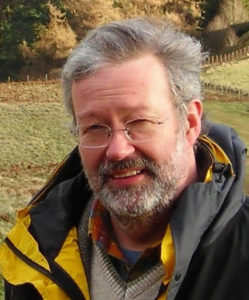
Jim Gallagher is a civil servant who escaped into academia over 10 years ago. As a public official his most recent job was as the UK government’s most senior adviser on devolution and other constitutional issues, working in the Cabinet office and the number 10 policy unit under Gordon Brown. Previous to that, his career in Edinburgh and Whitehall included heading the Scottish justice department, running the offices of successive Secretaries of State for Scotland, and working in the Blair number 10 policy unit, again on constitutional issues. Over the years he has dealt with subjects as diverse as prison management and local government finance. After leaving government, Jim was a Gwylim Gibbon fellow in Nuffield College, Oxford and a visiting professor at the University of Glasgow’s law school. He is also a non-executive director in a number of commercial and third sector enterprises. Jim’s main interest is in the territorial constitution of the United Kingdom, how devolution has developed, and is financed (he was secretary to the Calman Commission on Scottish devolution, and an adviser to various parliamentary committees). His publications include Scotland’s Choices (with Iain Maclean and Guy Lodge) an explainer on the issues in the 2014 Scottish referendum. At the moment especially he is interested in how the territorial constitution develops in response to challenges of Brexit and demands for Scottish independence.
Stephen Gethins, School of International Relations

Stephen Gethins is Professor of Practice in International Relations, Unversity of St Andrews. Before taking up his post at St Andrews Stephen served as the Member of Parliament for North East Fife. During his time in Parliament Stephen was twice selected to sit on the Foreign Affairs Select Committee. He was also the SNP spokesperson on Europe and International Affairs. He worked on issues such as the UK’s response to the war in Syria, relations with Russia, the Syrian refugee crisis and the conflict in Libya among others. He was also closely involved in cross party efforts to deal with Brexit and was one of the few UK parliamentarians to have worked in the EU institutions. Stephen has made regular appearances in UK and international broadcast media as well as writing for print media. He has also written about Scotland’s Foreign Policy footprint and raised the issue in the House of Commons. Before entering Parliament Stephen worked in democratisation and peace-building in the western Balkans and South Caucasus. He was also a Special Adviser to Scotland’s First Minister on EU and International Affairs as well as Energy and Climate Change.
Karen Katiyo, School of International Relations

Karen Katiyo is a doctoral candidate in the School of International Relations. Her research focuses on constitutional courts in sub-Saharan Africa and Eastern Europe following political transitions in the late 20th century. In particular, she seeks to develop a conceptual framework to map and assess court behaviour in post-transitional periods in aid of the ongoing re-imagining of the substance, scope, and purpose of constitutionalism globally. Karen’s research interests are a combination of law, political science, and history. She obtained an LLB (Hons) in 2018, followed by an MLitt in Legal and Constitutional Studies at the University of St. Andrews. Karen is a Research Fellow with the Centre for Global Law and Governance as well as a legal and policy consultant working on constitutionalism and the rule of law; access to justice; and the realisation of human rights in southern Africa.
She is the ILCR PGR representative.
Poppy Kershaw, School of History
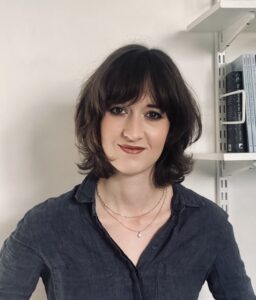
Poppy is a second year PhD student in the School of History, supervised by Professors John Hudson and Colin Kidd. Her research focuses on the work and intellectual world of the English legal historian F.W. Maitland. Attempting to recontextualise Maitland within a broader intellectual framework, much of Poppy’s research focuses on the historical relationship between legal-history, legal-thought and the development of the social sciences in the nineteenth century. Poppy completed a BA in Social Anthropology at the LSE in 2020, and in 2019 was the recipient of the Peter Loizos Prize for best undergraduate ethnographic report. In 2021/2022 she undertook an MLitt in Legal and Constitutional Studies at St Andrews, graduating with distinction. During her masters Poppy was awarded an internship at the ‘Centre for Global Law and Governance’ in the school of International Relations. Her essay, ‘Climates of Fear: Emotion, Risk, and Uncertainty in a Consideration of the ‘Precautionary Principle’, was published as part of the Junior Working Paper series 2022. Poppy is the co-founder and convenor of the ILCR’s PhD Legal Workshop series, providing an opportunity for PhD students and early career academics to present papers on legal and constitutional topics across all disciplines. In the summer 2023 she was honoured to participate in two workshops, as part of the ERC funded Joint Initiative in Education and Research, ‘Legal Knowledge: Transmission, Translation, Migration (12th -18th Century)’, University of St Andrews & University of Padua.
Professor Colin Kidd, School of History
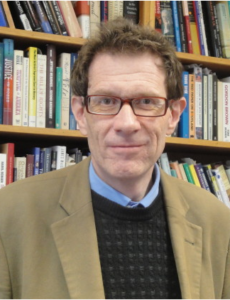
Colin Kidd arrived at the University of St Andrews in the summer of 2012. Originally from Ayr on the other side of Scotland, and taught for over fifteen years at the University of Glasgow and, more recently, had a short spell at Queen’s University Belfast. He relishes the seemingly brighter light and fresher air of Scotland’s east coast, as well as finding St Andrews a remarkably friendly and congenial university in which to work. His current research focuses on the intellectual history of the English Enlightenment and its nineteenth-century aftermath, particularly in fields such as antiquarianism, mythography and religious apologetic. Eventually, many years hence, these obsessions will intersect with an emerging interest in the history – and prehistory – of British anthropology. He is at his happiest riding these particular hobbyhorses, but I also have a stable of other subjects which fascinate me. These include constitutional theory, British as well as American, and the church history of my native county of Ayrshire in the age of Enlightenment. However, he is alert to the possibility that the parishes of eighteenth-century Fife might yield up treasures of their own to delight the connoisseur of theological controversy. He is also co-organiser , with Professor Gerry Carruthers (Glasgow University), of a Carnegie-funded project on the theme of ‘Literature and Union’, whose workshops and events run 2013-15.
Dr Myles Lavan, School of Classics

Myles Lavan’s main focus is a project to quantify the spread of Roman citizenship in the provinces from Augustus to Caracalla and rethink the history of citizenship in the light of the results. The project is supported by a Leverhulme Trust Research Fellowship (2014-15). He presents the methodology and the preliminary results in an article forthcoming in Past & Present 2016: ‘The spread of Roman citizenship 14-212 CE: Quantification in the face of high uncertainty’. Dr Lavan is also working on a commentary on Tacitus Annals 14 with Christopher Whitton and wrapping up a comparative study of elite integration in ancient empires on which he has been collaborating with Richard Payne and John Weisweiler for the past three years. The project has resulted in an edited volume, Cosmopolitanism and empire: Universal rulers, local elites and cultural integration in the ancient Near East and Mediterranean, forthcoming in OUP’sOxford Studies in Early Empires series. He is also working to expand on Slaves to Rome (Cambridge, 2013) with a number of article-length studies further exploring how the Roman elite conceived of their imperial project.
Dr David Miles, School of International Relations

David Miles has a PhD in International Relations from the University of St Andrews and an MA (Hons) in German with International Relations – also from St Andrews. His research interests encompass political and legal theory, institutions, and identity. He is particularly interested in how political and legal authority, and liberal values, can be sustained across different sub-state and supra-state identities and communities, one of the areas looked at in my recent book. My interest in political theory and law is centred on issues and questions arising at the intersection between domestic and global politics, and on how political communities fragment and cohere domestically and globally in response to particular ethical, practical, and legal challenges. He has taught in the School of International Relations since 2015 and has also taught in The Open University Law School. He is a Fellow of the UK Higher Education Academy. David’s PhD research was funded by a full Carnegie Scholarship from the Carnegie Trust for the Universities of Scotland. His book Democracy, the Courts, and the Liberal State: A Comparative Analysis of American and German Constitutionalism was published by Routledge in October 2020 under the Routledge Innovations in Political Theory series. He is Editor-in-Chief of Global Politics Magazine. A further research focus of his book is the role of international institutions in supporting liberal democratic institutions within states after World War Two, and the tensions between constitutional courts such as Germany’s Federal Constitutional Court and the EU’s increasingly powerful institutions. His book also assesses the relationship between the development of constitutionalism after 1945 and developments in international law and international institutions (seen in the work of Hersch Lauterpacht and the various conventions on human rights).
Dr Victoria Miyandazi, School of History

Victoria Miyandazi is a Knight Fellow in Legal and Constitutional Research at the University of St Andrews Institute of Legal and Constitutional Research. She is formerly a Lecturer at the University of Embu and was also a Researcher at the Oxford Human Rights Hub and the Kenyan Judiciary Committee on Elections. She is an Advocate of the High Court of Kenya and practised law at Okubasu, Munene & Kazungu Advocates LLP. She holds Doctor of Philosophy in Law, Master of Philosophy in Law and Bachelor of Civil Law Degrees from the University of Oxford where she studied as a Rhodes Scholar. She also holds a Bachelor of Laws (First Class Honours) Degree from Kenyatta University. She mainly teaches and writes on Equality Law, Human Rights, Constitutional Law, Administrative Law, Electoral Law, Property Law, Public International Law, and Comparative Law. She is the author of Equality in Kenya’s 2010 Constitution: Understanding the Competing and Interrelated Conceptions (Hart Publishing, 2021).
Victoria is the ILCR Post-Doctoral Representative.
Aidan O’Neill KC, Matrix Chambers

Aidan O’Neill KC is one of the UK’s leading barristers, and one of the few ‘double silks’, i.e. he is KC both in Scotland and in England & Wales. He has acted in a large number of high-profile cases before the UK Supreme Court, perhaps most notably the Prorogation case in 2019 (Cherry v Advocate General for Scotland/Miller v Prime Minister) and Miller case in 2017 concerning Brexit (R (Miller) v Secretary of State). His extensive legal practice spans commercial judicial review, constitutional law, and employment law, European law/public law, specifically in relation to planning and environmental issues. With a distinguished career, Aidan has acted as senior counsel in over twenty appeals before the House of Lords/UK Supreme Court. His legal expertise extends to international forums, having led cases before the Court of Justice of the European Union and appeared before the European Court of Human Rights. He also appears regularly in the Court of Appeal of England and Wales, the Administrative Court, the Court of Session (Inner and Outer House) and in a variety of statutory tribunals. In 2015, he received the Legal 500 UK Bar Award for EU law silk of the year. A prolific legal author, Aidan has contributed to numerous articles, blog posts, and practitioner texts. His published books, including ‘EU for UK Lawyers’, ‘Judicial Review in Scotland: A Practitioner’s Guide’, and ‘Decisions of the European Court of Justice and their Constitutional Implications’, reflect his dedication to legal scholarship. Currently, he is engaged in writing a new book entitled ‘EU Law after Brexit: A Guide for the Perplexed’ for Hart Publishing. He was in 2023 appointed to an Honorary Professorship at St Andrews, attached to the ILCR.
Stuart Pemble, Mills and Reeve

Having studied Mediaeval History at St Andrews, Stuart Pemble qualified as a solicitor in 1997. He is a transactional lawyer who drafts and negotiates the contracts for the design, construction and funding of construction and engineering projects throughout England and Wales. His career has taken him from the City of London to Birmingham via Cambridge. Stuart joined his current firm, Mills & Reeve, in 1999 and became a partner in 2005. Stuart is one of the editors of the Legal Notes section of Estates Gazette (contributing articles on construction and professional negligence) and is on the consultation board for the leading on-line resource, PLC Construction.
Dr Mateja Peter, School of International Relations

Mateja Peter joined the School of International Relations in September 2015. Previously, she worked as a Senior Research Fellow at the Norwegian Institute of International Affairs (NUPI), where she continues to collaborate on a number of projects. Dr Peter has also held a transatlantic post-doctoral fellowship (TAPIR) at the United States Institute of Peace, the German Institute for International and Security Affairs, and the Norwegian Institute for Defence Studies. She received her PhD from the University of Cambridge. Dr Peter’s interests include global governance and international organisations, peace operations and peacebuilding, the politics of international law, and IR theory (critical and constructivist approaches, international political sociology). She is interested in both theoretical and policy implications of the shift from short-term to sustained third-party engagements in contemporary interventions. Dr Peter is currently working on a book on international authority in statebuilding and an edited volume on United Nations peace operations in a changing global order.
Dr Jaqueline Rose, School of History

Dr Jacqueline Rose researches and teaches across a broad range of early modern British history. This was an era of political turmoil from the advent of the Tudor dynasty in 1485, the politics of royal minority and queenship, through to the dynastic union of the Three Kingdoms of the seventeenth century, their wars of the 1640s and the Revolution of 1688-9. It was also an age of religious upheaval: the downfall of the late medieval church, the Tudor Reformations and their fragmentation into religious diversity and early arguments for religious toleration in the seventeenth century. Her research reflects these interests in the political and religious ideas of early modern Britain, in particular the ideas and practices of Tudor and Stuart monarchy. She also works on the Church of England during the ‘Long Reformation’ from the 1530s to c.1700. Her first book explored the relationship between the monarchy and the Church of England in the later seventeenth century, while her current project is a study of ideas of political counsel and concepts of kingship.
Paul Seils, European Institute of Peace

Paul Seils leads the Conflict Justice and Reconciliation programme at EIP. He is a lawyer by profession. For more than twenty years he has worked in conflict and post conflict situations around the world, working with victims, governments and international organizations, focusing on the relationship between sustainable peace and justice. He lived and worked in Guatemala for five years after the end of the civil war there, designing and leading an investigation into the state’s genocide of Mayan groups in the 1980s. This proved a central element in the eventual prosecution of a former military dictator. He has served, among other things, as the Head of Situation Analysis at the Office of the Prosecutor of the ICC, the Chief of the Rule of Law and Democracy Unit at the United Nations Office of the High Commissioner for Human Rights in Geneva, and Vice President of the International Center for Transitional Justice in New York. He has written on human rights and justice widely over the last two decades. He taught on the advanced Masters course at Leiden University from 2015-2017. He is currently a Visiting Professor with the School of International Relations at St Andrew’s University, Scotland. His primary focus today is on rights-based dividends in peace processes, and how practical, rights-based ideas of reconciliation can support peace processes in the short and medium term.
